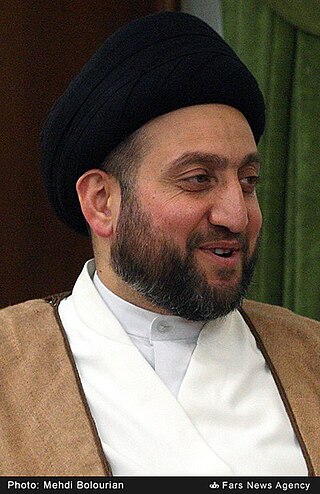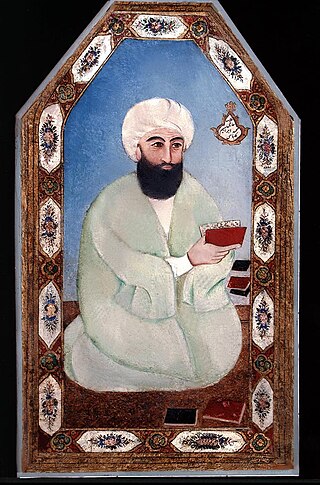Ali al-Hakim | |
|---|---|
| Title | Ayatollah |
| Personal | |
| Born | 1964 |
| Religion | Shia Islam |
| Senior posting | |
| Based in | Najaf, Iraq |
| Post | Ayatollah |
Sayyid Ali al-Hakim (born 1964) is an Iraqi high-ranking Shiite Ayatollah based in Najaf, Iraq.
Ali al-Hakim | |
|---|---|
| Title | Ayatollah |
| Personal | |
| Born | 1964 |
| Religion | Shia Islam |
| Senior posting | |
| Based in | Najaf, Iraq |
| Post | Ayatollah |
Sayyid Ali al-Hakim (born 1964) is an Iraqi high-ranking Shiite Ayatollah based in Najaf, Iraq.
This section of a biography of a living person does not include any references or sources .(September 2019) |
Al-Hakim is a member of the Hakim family of Shiite scholars.
Al-Hakim was born in Najaf, the son of Ayatollah Sayyid Abdul al-Sahib, and the grandson of the Grand Ayatollah Sayyid Muhsin al-Hakim; the latter is considered one of the greatest Shiite scholars of the 20th century. [1] In addition to his studies in secular schools, he joined the Islamic seminary at an early age in 1976.[ citation needed ]
Al-Hakim is the brother of Sayyid Jafar al-Hakim, who has visited the United States and delivered lectures on a variety of topics. [2]
He is also a nephew of Grand Ayatollah Mohammad Saeed Al-Hakim, one of the four main Grand Ayatollahs of Iraq.[ citation needed ]
He has visited the Hakim Foundation in the United States, which is run by family member Ammar Al-Hakim. [3]
This section of a biography of a living person does not include any references or sources .(September 2019) |
During his early studies in the Islamic seminary, Al-Hakim faced harassment and intimidation from Ba'ath party police and security forces. In particular, Al-Hakim was scrutinized for his seminars and participation in intellectual forums.
In 1980, Al-Hakim fled Iraq to Kuwait, and later Iran, to continue his seminary studies without facing repression by Saddam Hussein's government.
In 1994, Al-Hakim completed the highest level of study in the seminary, Bath al-Kharij, or "Advanced Studies". He then migrated to Lebanon, where he found employment as a professor, researcher, and writer.
Currently, he serves as the General Secretary of the Imam al-Hakim foundation, which he established in 2008.
This section of a biography of a living person does not include any references or sources .(September 2019) |
This section of a biography of a living person does not include any references or sources .(September 2019) |
This section of a biography of a living person does not include any references or sources .(September 2019) |
This section of a biography of a living person does not include any references or sources .(September 2019) |
A hawza or ḥawzah ʿilmīyah is the collective term for a madrasa where Shi'a Muslim scholars are educated.

Grand Ayatollah Sayyid Abu al-Qasim Musawi Khoei ( AH-boo al KAH-sim al KHOO-ee; was an Iranian Shia marja'. Khoei is considered one of the most influential twelver scholars.

Grand Ayatollah Sayyid Muhammad-Saeed al-Tabataba'i al-Hakim was an Iraqi senior Shi'a marja, and one of the most senior Shia clerics in Iraq.
Ayatollah Mohammad Mahdi Shamseddine was a Lebanese Twelver Shia scholar. Shahid Awwal who was known as Shamseddine, sun of the faith, was ancestor of Muhammad Mahdi.

Sayyid Ammar al-Hakim is an Iraqi cleric and politician who led the Islamic Supreme Council of Iraq (ISCI), from 2009 to 2017. He is currently the head of the National Wisdom Movement which is a political coalition in Iraq that was formed to contest the 2018 general election.
Ayatollah Sayyid Muhammad-Ridha al-Husayni al-Shirazi was an Iraqi Shia scholar, and the eldest son of Muhammad al-Shirazi.
Sayyid Mujtaba al-Husayni al-Shirazi. is an Iraqi Shia jurist.
Grand Ayatollah Sayyid Kamal al-Haydari is a Philosopher and Shia marja' from Iraq, who resides in Qom, Iran.
Ayatollah Sayyid Jafar al-Tabatabaei al-Hakim is an Iraqi high-ranking Shiite jurist in the city of Najaf.
The Hakim family is a prominent family of Shiite Islam scholars from Najaf, Iraq who claim descent from the Alids. They belong to a Tabatabaei branch whose scholarly involvement has revolved around Iraq for centuries. The family faced extensive persecution and executions at the hand of Saddam Hussein's government, yet it maintains a prominent role in Iraq and the Middle East.
Ayatollah Sayyid Muhammad-Ali al-Hakim (1911–2011) was an Iraqi high-ranking Shiite scholar. Ayatollah Muhammad al-Hakim was the father of the Grand Ayatollah Mohammad Saeed Al-Hakim.

Grand Ayatollah Sayyid Mohammad Hadi Milani was an Iranian-Iraqi marja'.
Grand Ayatollah Sheikh Muhammad-Husayn Kashif al-Ghita' was a Shiite jurist, philosopher, author, teacher, and lecturer. He was considered to be one of the highest ranking scholars in Iraq, yet less popular. He worked for the welfare of the Shia community in Iraq and for Sunni-Shia rapprochement and solidarity.
Marja' is a title given to the highest level of Twelver Shia religious cleric, with the authority given by a hawzah to make legal decisions within the confines of Islamic law for followers and clerics below him in rank. The highest ranking marjiʿ is known as the marja al-mutlaq or marja al-taqlid al-mutlaq. A marji' is usually also a grand ayatollah.

The Najaf Seminary, also known as the al-Hawza Al-Ilmiyya, is the oldest and one of the most important Shia seminaries (hawza) in the world. It is located near the Imam Ali Shrine in the city of Najaf in Iraq, and also operates a campus in Karbala, Iraq. It was established by Shaykh al-Tusi, and continued as a center of study after the establishment of modern Iraq in 1921.

Grand Ayatollah Sayyid Abd al-A'la Musawi Sabziwari was an Iranian Shia marja'. He is regarded as one of the most influential grand religious authorities and he was a contemporary of Abu al-Qasim Khoei.
Ayatollah Sheikh Hasanali Morvarid was a senior Iranian Shia scholar and teacher.

Ayatollah Sayyid Ali al-Husayni al-Milani is an Iraqi-Iranian Shia scholar.

Grand Ayatollah Sheikh Mohammad Ibrahim al-Karbasi (kalbasi) known as Sahib al-Isharat was a Shia jurist, mujtahid, fundamentalist, Quran commentator, theologian, scholar of biographical evaluation and marja', and considered the reviver of the Isfahan Seminary in the 19th century.
Ayatollah Sheikh Muhammad-Baqir al-Irawani is an Iraqi Shia scholar, religious authority, and poet.